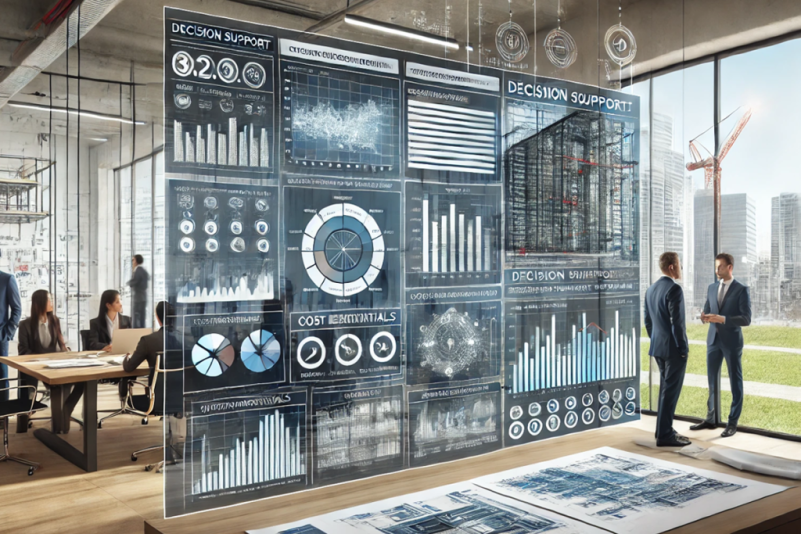A decision support tool is a computer-based tool that assists decision-making. The tools analyse data to evaluate a range of options and identify the optimal option. They are most useful where the data is complex and requires evaluating multiple criteria simultaneously that might interact or be contingent with each other.
Decision support tools should ideally be evidence-based using verified and standardised data to ensure accuracy. They should also be user-friendly as the whole point of them is to make complex decision making easier and more reliable.
What problems are we trying to solve with decision support tools and Construction 4.0?
Currently, there is a profound limitation in the way that construction is performed in Aotearoa New Zealand. The challenge is that complex decisions are being made based on simple data inputs. The decision points in the process are done in linear silos, meaning there’s little communication or data sharing between stages to create inter-connection or data-derived decision support.
The process is entrenched and far from optimised. For example, designers do not have adequate tools to optimise designs for ease of manufacture/fabrication, let alone the ability to resolve the conjoint considerations required to deliver design for sustainability, constructability, te ao Māori, resilience and affordability simultaneously. The result is missed opportunities for smarter, more efficient construction!
Such decisions require collection, connection and analysis of complex datasets, which is where Construction 4.0—integrating advanced digital and data-driven approaches into construction—comes into play.
By embracing complexity science and Construction 4.0 approaches we can start tackling these long-standing limitations and revolutionise conventional construction in the way we design and build.
How does this relate to our Ngākopa Construction 4.0 project?
The ultimate goal of our research project is to develop a decision support tool to assist designers and specifiers address the above problems. We hope to do this by developing a tool (or a pathway to a tool) that not only streamlines the design process but also integrates various factors like sustainability, affordability, and cultural considerations.
To do this, the following research questions must be addressed:
- Understanding the whole picture: How do we understand the interacting behaviours of the complex system of data required for optimised design as something that is more than the sum of its parts?
- Managing complexity: How do we capture this complexity fully, rather than just reduce it – and then translate it into practical tools that can support the sector?
- Leveraging technology: What Industry 4.0 technologies – like AI, machine learning, digital twins or automation – should we use to make this happen?
- Getting the data ready: What are the data protocols needed to ensure everything works smoothly together?
- Structural optimisation: What are the structural optimisation models required to be developed or identified that aren’t just innovative, but also practical to implement?
- Real-world impact: How will optimising decisions impact day-to-day construction work on the ground?
- Te Ao Māori integration: How can we embed the interface between indigenous knowledge and perspectives in Construction 4.0 approaches?
- Ensuring adoption: What will ensure industry adoption of these tools and approaches?
Why should this matter to you?
For professionals in the construction sector, these tools mean a smoother, smarter, and more sustainable way to work. Whether you’re a designer, builder, or supplier, the decision support tools we’re developing could help you streamline projects, reduce costs, and meet the growing demands for sustainability and resilience.
If you want to unpack more around Construction 4.0 and how it can change the way you work – we strongly recommend attending our Construction 4.0 Conference in November. With a spotlight on Construction 4.0 – the latest advances in AI, sustainability, and data-driven innovations will be front and centre, providing attendees with essential insights for transforming their operations and projects. A special focus will be given to embedding circular design and mātauranga Māori into the sector, ensuring a uniquely Aotearoa perspective on innovation.
Expect panel discussions, case studies, and hands-on tech displays, offering a comprehensive look at how the construction industry can move forward by adopting smart technologies and practices.
Register today here: https://www.hera.org.nz/event/construction40conference/


